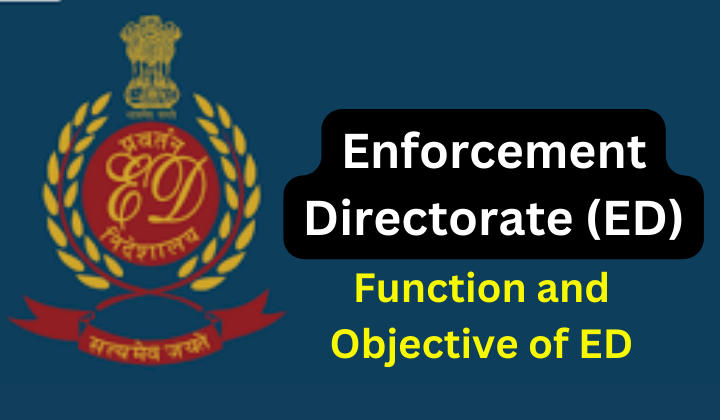Table of Contents
The Enforcement Directorate (ED) is India’s financial watchdog, acting as both a law enforcement agency and an economic intelligence unit. Established in 1956, it falls under the Department of Revenue in India’s Ministry of Finance. The ED tackles economic crimes like money laundering, foreign exchange violations, and corruption. They investigate these offenses, prosecute offenders, and aim to seize assets acquired through illegal means. Recent news highlights the power of the ED, with the arrest of Delhi’s Chief Minister in an alleged money laundering case.
What is Enforcement Directorate?
The Enforcement Directorate (ED) is a vital agency within the Indian government responsible for enforcing economic laws and regulations. It focuses on matters such as foreign exchange management, money laundering prevention, and combating economic crimes. Operating under the Ministry of Finance, it investigates violations of laws like the Foreign Exchange Management Act (FEMA) and the Prevention of Money Laundering Act (PMLA). The ED conducts inquiries, prosecutes offenders, and collaborates internationally to combat financial crimes, ensuring the integrity of India’s financial system.
Objective of Enforcement Directorate
The Enforcement Directorate (ED) is an Indian government agency that tackles financial crime. Their main objective is to maintain a healthy financial environment in India by:
- Black money refers to income that is earned illegally and hidden from the authorities. The ED works to stop the generation and circulation of this money within India.
- The Foreign Exchange Management Act (FEMA) regulates how money can be exchanged between India and other countries. The ED investigates and prosecutes violations of these rules.
- Money laundering is the process of taking illegally obtained money and disguising it as legitimate income. The Prevention of Money Laundering Act (PMLA) empowers the ED to go after people who launder money.
In recent years, the ED has also been given the responsibility of enforcing the Fugitive Economic Offenders Act (FEOA), which targets economic offenders who flee the country to avoid facing legal consequences. So, the ED acts as a watchdog to ensure India’s financial system is functioning properly and free from criminal activity.
Function of Enforcement Directorate
The Enforcement Directorate (ED) is responsible for the following:
- Investigating potential violations of FEMA guidelines. The ED possesses the authority to identify infractions and levy fines of up to three times the amount in question.
- Examining laws and regulations under the Prevention of Money Laundering Act (PMLA). Those found culpable may face asset seizure, with orders issued under Chapter III of the Money Laundering Act to attach assets.
- Addressing cases involving fugitives from India under the Fugitive Economic Offenders Act 2018 to prevent economic criminals from evading justice.
- Adjudicating show-cause notifications issued under the non-abolished Foreign Exchange Regulation Act, 1973 (FERA).
- Managing cases under the Conservation of Foreign Exchange and Prevention of Smuggling Activities Act, 1974 (COFEPOSA), including preventative detention for FEMA violations.
- Providing assistance to foreign nations in asset recovery efforts under the PMLA and matters related to money laundering.
Importance of Enforcement Directorate
The Enforcement Directorate (ED) holds significance due to several factors:
- By conducting thorough investigations, the ED sends a strong message to potential offenders that economic crimes will not be tolerated. This commitment bolsters the nation’s financial integrity and acts as a deterrent against such offences.
- The ED’s consistent efforts in recovering stolen assets from economic criminals contribute to compensating victims of financial crimes. This endeavor mitigates the financial losses incurred by such offences, thereby alleviating their impact.
- Through its investigations and prosecutions, the ED plays a crucial role in uncovering instances of financial misconduct and corruption. This fosters accountability and transparency, both in the public and private sectors, thereby strengthening governance mechanisms.
- Economic crimes have the potential to inflict severe damage on the economy. By actively addressing financial crimes, the ED contributes to the growth and stability of the Indian economy. Its actions support developmental initiatives and foster economic prosperity for the nation.
How Does Enforcement Directorate Works?
The Enforcement Directorate (ED) is a multi-pronged agency that tackles financial crime in India. Here’s a glimpse into their working style:
- Intelligence Gathering: The ED gathers intel from various sources like tip-offs, financial transactions, and information sharing with other agencies. This helps them identify potential cases of money laundering, FEMA violations, or the generation of black money.
- Investigation: Once a case is flagged, ED officials investigate the matter. This may involve:
-Analyzing financial records to track suspicious transactions.
-Conducting raids and searches to seize evidence and documents.
-Questioning individuals suspected of involvement.
-Collaborating with foreign counterparts for international financial crimes. - Enforcement Actions: Based on their investigation, the ED can take various enforcement actions such as:
-Seizing Assets: The ED has the authority to temporarily freeze or permanently seize assets acquired through illegal means.
-Issuing Summons and Arrests: They can summon individuals for questioning and arrest those suspected of serious financial crimes.
-Filing Cases: The ED files cases in special courts designated for handling FEMA and PMLA cases. - Prosecution and Confiscation: The ED prosecutes the accused in court. If convicted, the courts can confiscate the illegally obtained money or assets and impose fines.
- International Cooperation: Financial crimes often have international connections. The ED works with law enforcement agencies from other countries to track down laundered money and fugitive economic offenders.
- Important to Note: The ED’s power to arrest is limited compared to regular police forces. They typically need a warrant or court permission for arrests. By following these steps, the Enforcement Directorate works to disrupt financial crimes, recover black money, and enforce economic laws in India.




 TSPSC Group 1 Question Paper 2024, Downl...
TSPSC Group 1 Question Paper 2024, Downl...
 TSPSC Group 1 Answer key 2024 Out, Downl...
TSPSC Group 1 Answer key 2024 Out, Downl...
 UPSC Prelims 2024 Question Paper, Downlo...
UPSC Prelims 2024 Question Paper, Downlo...




